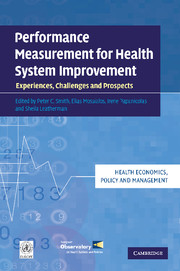Book contents
- Frontmatter
- Contents
- Foreword
- Acknowledgements
- List of contributors
- List of boxes, figures and tables
- Part I Principles of performance measurement
- Part II Dimensions of performance
- Part III Analytical methodology for performance measurement
- Part IV Performance measurement in specific domains
- 4.1 Performance measurement in primary care
- 4.2 Chronic care
- 4.3 Performance measurement in mental health services
- 4.4 Long-term care quality monitoring using the inteRAI common clinical assessment language
- Part V Health policy and performance measurement
- Part VI Conclusions
- Index
4.1 - Performance measurement in primary care
Published online by Cambridge University Press: 06 July 2010
- Frontmatter
- Contents
- Foreword
- Acknowledgements
- List of contributors
- List of boxes, figures and tables
- Part I Principles of performance measurement
- Part II Dimensions of performance
- Part III Analytical methodology for performance measurement
- Part IV Performance measurement in specific domains
- 4.1 Performance measurement in primary care
- 4.2 Chronic care
- 4.3 Performance measurement in mental health services
- 4.4 Long-term care quality monitoring using the inteRAI common clinical assessment language
- Part V Health policy and performance measurement
- Part VI Conclusions
- Index
Summary
Introduction
This chapter explores the value and complexities of measuring performance in primary care. We begin with a definition of primary care and a description of its importance within the wider health-care system. We then explore the importance of measuring performance in this setting and provide an overview of some of the quality improvement strategies currently in use. The second part of the chapter describes a conceptual framework for quality measurement and reporting; the qualities of an ideal performance measure; and the relative value of process and outcome measures within primary care. The third part describes three very different primary-care focused systems in which performance measurement has been critical to improving health care: (i) Quality and Outcomes Framework in the United Kingdom; (ii) changes in the Veterans Health Administration in the United States; and (iii) European Practice Assessment. We conclude by highlighting challenges that policy-makers, researchers and clinicians face in future performance measurement in primary care.
Background to performance measurement in primary care
Defining primary care
WHO made the improvement of primary health care a core policy in the Alma-Ata declaration (WHO 1978) and the Health for All by the Year 2000 strategy. The World Health Assembly renewed the commitment to global improvement in health (particularly for the most disadvantaged populations) in 1998 and this led to the Health for All in the 21st Century policy and programme.
- Type
- Chapter
- Information
- Performance Measurement for Health System ImprovementExperiences, Challenges and Prospects, pp. 371 - 405Publisher: Cambridge University PressPrint publication year: 2010
- 5
- Cited by



